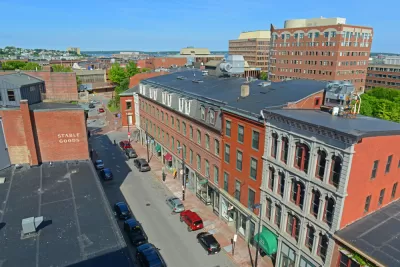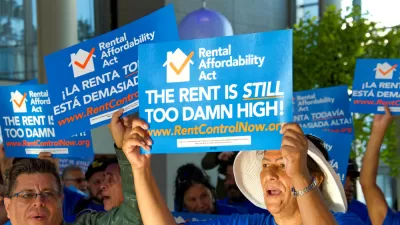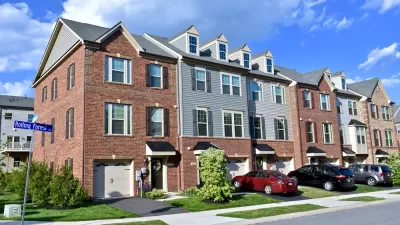Rent control was dealt another high-profile setback in California, and the Green New Deal is a hot button issue stuck in limbo in Congress. Both efforts got the go-ahead from voters in Portland, Maine in November.

Jared Brey provides insight into the outcomes of a particularly significant election day in Portland, Maine, where voters approved rent control and a local version of a local Green New Deal (see also Planetizen's complete coverage of local and state election results from the 2020 election).
On rent control, Portland voters achieved a major reversal of a vote on rent control just three years ago, when voters rejected a similar ballot measure by two-thirds of the vote.
Evidently, something has changed. In fact, says Jack O’Brien, who organized the 2017 Fair Rent Portland referendum and helped create the successful effort this year, several things have changed. For one thing, turnout was much higher this year. For another, in the intervening years, jurisdictions like Oregon and New York expanded rent control and rent stabilization. The Black Lives Matter Maine movement put affordable-housing at the center of its agenda. And voters saw that the arguments landlords made against rent control in 2017 — that affordable housing was in the works, and rent control would complicate it — didn’t hold water, O’Brien says.
As for the city's Green New Deal, Brey credits Portland as the first such law to be approved directly by voters.
It would require any project receiving more than $50,000 in public subsidy to include solar or green roofs and to match other energy-efficiency standards, and it would require developers of those projects to meet certain pay standards and employ apprentices on each job. It also increases inclusionary housing standards, so that 25% of units in new projects will be affordable to people earning up to 80% of Area Median Income, which in Portland is just over $100,000 a year for a family of four.
The article includes a lot more insight on the political coalition, and its opponents, that produced these progressive victories in Portland.
FULL STORY: Portland, Maine Voters Approve a “Green New Deal” and Rent Control

Planetizen Federal Action Tracker
A weekly monitor of how Trump’s orders and actions are impacting planners and planning in America.

San Francisco's School District Spent $105M To Build Affordable Housing for Teachers — And That's Just the Beginning
SFUSD joins a growing list of school districts using their land holdings to address housing affordability challenges faced by their own employees.

The Tiny, Adorable $7,000 Car Turning Japan Onto EVs
The single seat Mibot charges from a regular plug as quickly as an iPad, and is about half the price of an average EV.

Seattle's Plan for Adopting Driverless Cars
Equity, safety, accessibility and affordability are front of mind as the city prepares for robotaxis and other autonomous vehicles.

As Trump Phases Out FEMA, Is It Time to Flee the Floodplains?
With less federal funding available for disaster relief efforts, the need to relocate at-risk communities is more urgent than ever.

With Protected Lanes, 460% More People Commute by Bike
For those needing more ammo, more data proving what we already knew is here.
Urban Design for Planners 1: Software Tools
This six-course series explores essential urban design concepts using open source software and equips planners with the tools they need to participate fully in the urban design process.
Planning for Universal Design
Learn the tools for implementing Universal Design in planning regulations.
Smith Gee Studio
City of Charlotte
City of Camden Redevelopment Agency
City of Astoria
Transportation Research & Education Center (TREC) at Portland State University
US High Speed Rail Association
City of Camden Redevelopment Agency
Municipality of Princeton (NJ)





























